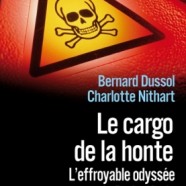Trafigura lies
At the witness stand in the Amsterdam courtroom, Trafigura steers the truth as ruthlessly as it steered the Probo Koala. Trafigura’s defence lawyer declared that all the damages caused by refining at sea of Petroleos Mexicanos’ hyper sulphurized naphtha and all the health risks from the desulphurization waste could be only a “myth” spread by ecologists, journalists, and politicians. In his opening defence he stated that “It has not been proven that the events in the Ivory Coast [the spreading of Probo Koala’s waste in Abidjan] cause serious harm to the health of the population, or that they could have done”.
Black Whales
Subjet : BP Oil Spill
The cumulated amount of oil in the ocean is estimated to range between a low bracket of 300,000 and high a high bracket of 500,000 tons. The Gulf of Mexico has a surface area of 1,500,000 km²; on May 2nd fishing was prohibited within a closed area of 17,000 km². Today, the no take zone extends to 225,000 km². The sale of potentially contaminated seafood must be forbidden to avoid any risk of poisoning Americans.
Yet, other mammals feed exclusively on seafood in the Gulf of Mexico and its adjacent seas. According to NOAA (National Oceanic and Atmospheric Administration), 29 species of marine mammals are present in the Gulf of Mexico. In “normal” conditions, they are exposed to the risk of collisions and to acoustic disturbances caused by maritime transport and the numerous offshore oil and gas platforms. Amongst marine mammals, the most vulnerable are the Manatees. Threatened with extinction, these pacific and slow moving sea cows are already victims of propellers from ships and recreational crafts. Manatees are extremely sensitive to oil spills and to the saturation of their preferred food : underwater meadows of sea grass.
Open letter to Mel Gibson
Dear Mel Gibson,
In the Lloyd’s List of September 12th 2007 in the article “From carbon footprints to CO2 ship blueprints” we read that you openly show your support to a project to design vessels twice the size of a normal capesize bulker to transport carbon dioxide (CO2). “BW Shipping boss Andreas Sohmen-Pao reveals green ambitions and has ally in actor Mel Gibson”. This would be done with the intention to use the CO2 “to make oil and gas fields more productive” i.e. Enhanced Oil Recovery (EOR). More than 40 Mt of CO2 are currently used each year in the United States to recover oil. Most of the CO2 comes from deep natural accumulations of CO2 while about 5 % comes from industrial sources. Some of the CO2 used in EOR today is stocked in the well from where it escapes in the mid term, with the exception of the Weyburn oil field pilot project in Canada where the CO2 is recaptured and re-injected for permanent sequestration.
Robin des Bois a French NGO has been fighting for the protection of Man and the Environment since 1985. Robin des Bois has for over 20 years been involved, in the banning of waste storing and waste dumping in or under the world’s oceans. We have very strong reservations on the concepts and projects exposed at the Forbes Global CEO Conference in Singapore by Mr Sohmen-Pao. More generally we have serious doubts on currently exposed Carbon Capture and Storage (CCS) technological solutions.











